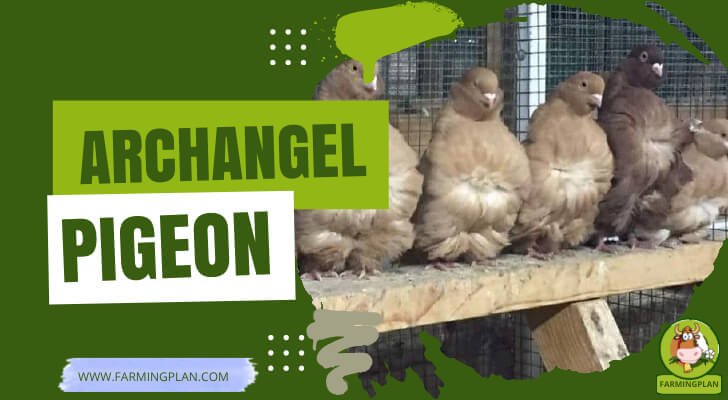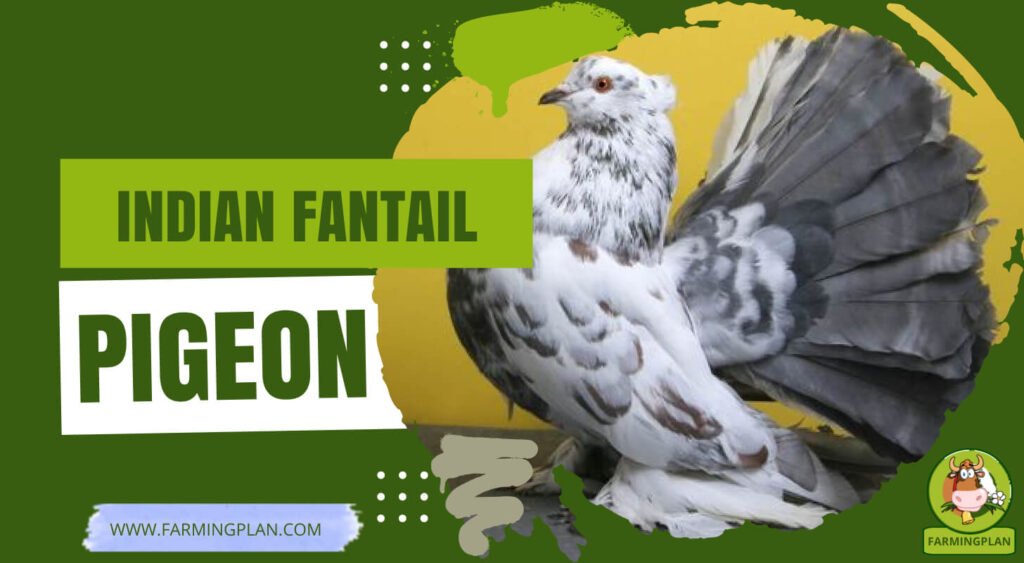I’ve always been fascinated by pigeons, but it wasn’t until I brought home my first Chinese Owl Pigeon that I truly understood their charm. Their unique, owl-like appearance and gentle nature quickly won me over. Caring for them has been a delightful experience— they’re easygoing, affectionate, and surprisingly low-maintenance. Watching them thrive in their spacious loft and interact with each other has been incredibly rewarding. If you’re looking for a beautiful, friendly, and easy-to-care-for pet, I highly recommend the Chinese Owl Pigeon. Trust me, they’ll steal your heart just as they did mine!

Origin and History of Chinese Owl Pigeons
- The Chinese Owl Pigeon is a domesticated pigeon breed with a rich history in China. Originating in the early 19th century, these pigeons were initially bred for their beauty and distinct features. Their name “Owl” comes from their round head and large, expressive eyes, resembling an owl’s features. These pigeons have a long-standing tradition in pigeon fanciers’ communities, and over time, they were selectively bred to enhance their appearance and temperament.
- Though initially from China, the breed spread to other parts of the world, where it became a popular choice for pigeon enthusiasts. Their charm lies not only in their appearance but also in their gentle nature and ease of care.
Physical Characteristics of Chinese Owl Pigeons
Chinese Owl Pigeons are easily recognizable due to their unique physical traits. Here’s a detailed look at their appearance:
- Size: They are medium-sized pigeons, with adults weighing between 300 to 400 grams.
- Feather Type: They have soft, smooth feathers in various color patterns, including white, black, blue, and multicolored.
- Head and Eyes: Their most notable feature is their round head with a distinct crown and large, expressive eyes that give them an owl-like appearance. The head is set on a short, thick neck.
- Body: The body is compact and well-rounded. Their broad chest gives them a puffed-out look, which is incredibly impressive when excited or contented.
- Wings and Tail: Their wings are short, and their tail is broad and slightly fan-shaped, adding to their elegance.
These unique traits make them visually stunning and contribute to their popularity among pigeon keepers.
Read More: Archangel Pigeon
Behavior and Temperament of Chinese Owl Pigeons
Chinese Owl Pigeons are known for their calm and friendly temperament. They are not aggressive, making them ideal companions for beginners and seasoned bird lovers. Here’s a closer look at their behavior:
- Social Birds: Chinese Owl Pigeons are social and enjoy the company of other pigeons. They thrive in groups and get along well with different bird species.
- Gentle Nature: Unlike other pigeon breeds, Chinese Owl Pigeons are gentle and can be hand-fed. They enjoy the presence of humans and can become affectionate, though they are not overly dependent.
- Intelligence: These pigeons are intelligent and can quickly adapt to different environments. They can be trained to return to their loft or a designated area, making them ideal for pet owners who want a manageable bird.
- Quiet: Chinese Owl Pigeons are relatively calm compared to other pigeon breeds. Their soft coos make them suitable for homes or areas where noise may be an issue.
Their friendly nature and gentle demeanor make them popular among first-time pigeon owners.
Chinese Owl Pigeon Care and Maintenance
Proper care and maintenance are key to keeping Chinese Owl Pigeons healthy and happy. Below are some essential care tips:
- Feeding: A balanced diet is crucial for the health of Chinese Owl Pigeons. Please provide them with high-quality pigeon pellets, seeds, and fresh vegetables. A mixture of grains like millet, corn, and wheat is beneficial. Fresh water should always be available.
- Grooming: Regular grooming is essential to keep their feathers in top condition. You don’t need to bathe them often, but occasional baths help maintain clean plumage. Brush them gently with a soft brush to remove dirt and debris.
- Housing: Chinese Owl Pigeons require a spacious and clean loft or aviary. Their home must be free from drafts and have sufficient ventilation. Keep the floor covered with soft bedding, like straw or wood shavings, to keep them comfortable.
- Health: Regularly check for signs of illness, such as changes in behavior, droppings, or loss of appetite. Ensure that their environment is clean and free of pests. Consider consulting a vet specializing in birds for routine check-ups.
By following these care tips, you can ensure your Chinese Owl Pigeon remains healthy and well-cared for.
Read More: English Carrier Pigeon
Breeding Chinese Owl Pigeons
Breeding Chinese Owl Pigeons can be an exciting experience. Here’s a step-by-step guide to help you successfully breed them:
- Choosing a Mate: Select a healthy pair of pigeons for breeding. Ensure they are of similar age and size. It’s a compatible pair that is essential for mating.
- Nesting: Provide a comfortable nesting area with clean bedding and space for the female pigeon to lay eggs. Make sure the nesting box is quiet and free from disturbances.
- Egg Laying and Incubation: Female pigeons will lay one or two eggs, and both parents take turns incubating them. The incubation period lasts around 18-19 days.
- Caring for the Chicks: Once the eggs hatch, the parents feed the chicks with “pigeon milk,” a special secretion from the parents’ crop. They will also ensure the chicks have a clean, safe growing environment.
- Weaning: After 4-6 weeks, the chicks will begin to eat solid food and are ready to be weaned. At this point, they can be separated from their parents and moved to their own space.
Breeding Chinese Owl Pigeons requires patience and care, but with the right environment and attention, you can raise healthy chicks.
Diet and Nutrition
A balanced diet is essential for the health of Chinese Owl Pigeons. Here are some diet recommendations:
- Pigeon Pellets: High-quality pigeon pellets are an essential part of their diet. These pellets are designed to meet their nutritional needs and can be supplemented with seeds and grains.
- Seeds and Grains: A variety of seeds and grains, such as sunflower seeds, millet, and corn, should be offered. These provide essential fats and carbohydrates.
- Fresh Vegetables: Vegetables like spinach, lettuce, and carrots can be supplemented to their diet. Fresh fruit, such as apples and berries, is also beneficial.
- Clean Water: Fresh water is a must at all times. Make sure to clean the water container daily to avoid bacteria buildup.
By providing a balanced diet, you can ensure that your Chinese Owl Pigeons remain healthy and active.
Read More: Pouter Pigeon
Housing and Environment
Creating the right environment for Chinese Owl Pigeons is crucial for their well-being. Here’s what you need to know:
- Loft Size: The loft or aviary should be spacious enough for the pigeons to move around comfortably. Aim for at least 4-6 square feet of space per pigeon.
- Bedding: For the pigeons to nest on, use soft bedding material like straw, wood shavings, or sawdust. Avoid using newspaper, as it can be slippery and cause injury.
- Ventilation: To keep the loft fresh, ensure good airflow and ventilation. However, avoid placing the loft in areas that are too windy or exposed to extreme temperatures.
- Safety: Keep the loft secure from predators such as cats, dogs, or birds of prey. Use sturdy materials for the walls and windows to prevent escape.
Your pigeons will thrive and stay healthy by providing a safe and comfortable environment.
Common Health Issues and Solutions
Chinese Owl Pigeons are generally healthy, but like all animals, they can experience health problems. Some common health issues include:
- Parasites: Pigeons can be infected with mites, lice, and worms. Check them regularly for signs of these parasites and use appropriate treatments if necessary.
- Respiratory Infections: Pigeons are prone to respiratory infections, which can be caused by poor ventilation or damp conditions. Ensure that their environment is dry and well-ventilated.
- Feather Plucking: Sometimes, pigeons pluck their feathers due to stress or boredom. To avoid this behavior, provide them plenty of space, social interaction, and stimulation.
If your pigeons show signs of illness, consult a veterinarian specializing in birds for advice and treatment.
Additional Ideas for Owning Chinese Owl Pigeons
Here are some additional ideas for enhancing your experience with Chinese Owl Pigeons:
- Pigeon Shows: Participate in pigeon shows to showcase your birds’ beauty and temperament. Many pigeon enthusiasts compete in local and international competitions.
- Bonding: Spend time with your pigeons to bond with them. Hand-feed or allow them to roam freely in a safe, enclosed area.
- Join Pigeon Clubs: Connect with other enthusiasts through clubs and online forums. Sharing experiences and advice can help you become a better pigeon keeper.
These ideas can enhance your enjoyment of owning Chinese Owl Pigeons and help you build a connection with the bird community.
FAQ
What are Chinese Owl Pigeons known for?
Chinese Owl Pigeons are known for their round head, large eyes, and gentle temperament.
How do I care for Chinese Owl Pigeons?
Care involves a balanced diet, a spacious and clean environment, and regular health checks.
Can Chinese Owl Pigeons breed in captivity?
Yes, with the right conditions, Chinese Owl Pigeons can successfully breed in captivity.
What is the lifespan of Chinese Owl Pigeons?
Chinese Owl Pigeons can live up to 15 years or more with proper care.
Are Chinese Owl Pigeons good pets for beginners?
Yes, they are friendly, easy to care for, and make excellent pets.
Conclusion
Chinese Owl Pigeons are a stunning and friendly breed known for their round heads, large eyes, and gentle nature. They are relatively easy to care for, requiring a balanced diet, a clean, spacious loft, and regular health monitoring. These pigeons are excellent for beginners and seasoned bird enthusiasts due to their calm temperament and ability to breed in captivity. Providing the proper care and environment allows you to enjoy a happy, healthy Chinese Owl Pigeon that has thrived in your care for many years. Their beauty, personality, and low-maintenance requirements make them an excellent choice for pet owners.

